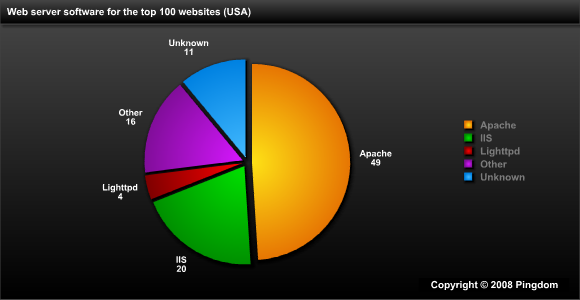There has been a lot of talk about the decline of Apache’s dominance as a web server, with competition from IIS and other alternatives like Lighttpd, but Apache is still king of the hill when you look at the top 100 websites in the US.

We here at Pingdom have noted a very wide range of web server software for the websites that we monitor uptime for. So, out of curiosity (once again) we decided to see what kind of web server software is in use by the most popular websites in the US.
We collected this information by looking at the HTTP response headers for the top 100 websites (according to Alexa.com). The HTTP response header will usually reveal what web server software the website is running on.
Web server software by numbers
Though Apache and IIS dominate (together they have at least 69% of the top 100 websites), Lighttpd and some of the other smaller web servers have started to carve themselves a niche. It’s also interesting to note that only one out of the top 100 websites is running the much-touted IIS 7, and that is Microsoft.com.
Here is a detailed breakdown of the numbers we collected.
| Server | Total |
|---|---|
| Apache (unknown version) | 31 |
| Apache 1.3.* | 8 |
| Apache 2.0.* | 5 |
| Apache Coyote 1.1 | 5 |
| Microsoft IIS 5.0 | 3 |
| Microsoft IIS 6.0 | 16 |
| Microsoft IIS 7.0 | 1 |
| Lighttpd | 4 |
| LiteSpeed | 2 |
| nginx | 2 |
| Sun ONE Web Server | 2 |
| Other | 10 |
| Unknown | 11 |
Any web server software with less than two websites was placed in the “other” category. Some HTTP response headers didn’t contain any information about the web server software and ended up in “unknown” (11 out of 100).
A couple of bonus factoids
The HTTP headers often contain a lot of interesting information. Here are some additional things we found out from the header information.
-
- 66 out of the 100 websites reported support for gzip content encoding.
-
- WordPress.com has this line in its response header: “X-hacker: If you’re reading this, you should visit automattic.com/jobs and apply to join the fun, mention this header.”

Small disclaimer: It is possible for websites to report incorrect information about the web server software in the header. This can sometimes be done for security reasons.



























